Dendritic Cell Therapy for Cancer Treatment in Germany
What Is Dendritic Cell Therapy (DCT)?
Dendritic Cell Therapy (DCT) is a cutting-edge, highly personalized form of cancer immunotherapy that empowers your own immune system to fight cancer more effectively. Instead of using external chemicals or radiation, this therapy works by retraining the body’s natural defenses to recognize and destroy cancer cells—just like they would a virus or bacteria.
Here’s how it works: a small amount of your blood is drawn to isolate monocytes, which are then matured in a special lab setting into dendritic cells—the most powerful messengers of the immune system. These cells are then exposed to your tumor’s unique antigens, giving them a “blueprint” of what to attack. Once reintroduced into your body, these primed dendritic cells stimulate cytotoxic T-cells—your immune army—to seek out and eliminate cancer cells with remarkable precision.
Whether it’s being used for metastatic breast cancer, glioblastoma, pancreatic tumors, or recurrent ovarian cancer, DCT is gaining traction in Germany as a promising, non-toxic option for patients who may have exhausted traditional therapies. German cancer institutes are now integrating DCT into comprehensive treatment plans that focus not just on survival—but on improving quality of life, energy, and long-term immunity.
From Dendritic Cell Therapy for Metastatic Breast Cancer in Germany to Glioblastoma, this targeted immune intervention is becoming a cornerstone of integrative oncology in German cancer centers.
Pathomechanism: The Immunological Rationale
Dendritic Cell Therapy (DCT) is a special treatment that uses your own blood to help your body fight cancer. Doctors take a small sample of your blood, prepare special cells in a lab to recognize your cancer, and then put them back into your body. These cells help your immune system find and attack the cancer more effectively. It’s a gentle and natural approach with fewer side effects, and it’s being used in Germany for hard-to-treat cancers like breast, brain, ovarian, and pancreatic cancer. Many patients try this when other treatments haven’t worked and are looking for a safer, hopeful option.
Dendritic cells are the sentinels of the immune system. In DCT:
- Monocyte isolation → via leukapheresis.
- Ex vivo differentiation → into mature dendritic cells.
- Antigen pulsing → using patient-specific tumor lysates or peptide antigens.
- Re-administration → subcutaneously or intranodally.
- T-cell priming → initiating robust cytotoxic T-lymphocyte (CTL) activation.
- Immune-mediated tumor targeting → leading to apoptosis of cancer cells with minimal systemic toxicity.
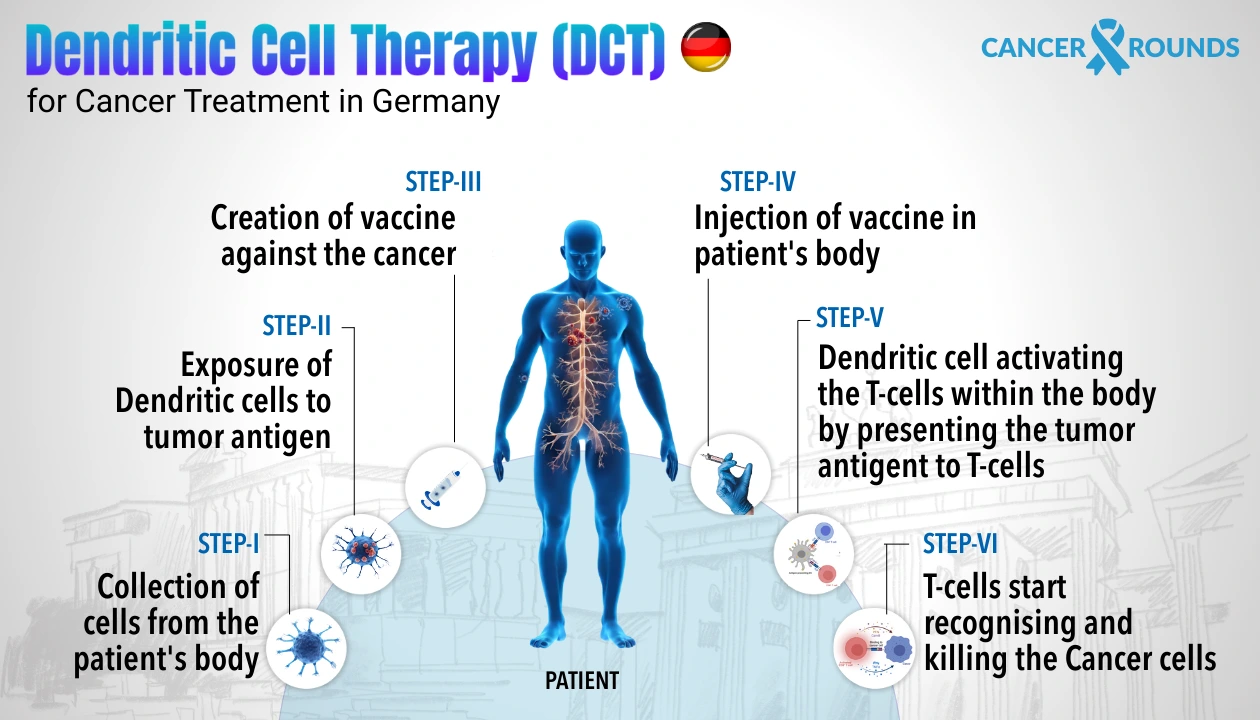
Indications for DCT in Germany
- Dendritic Cell Therapy for Metastatic Breast Cancer in Germany
- DCT Is Changing the Outlook for Stage 4 Pancreatic Cancer in Germany
- Prostate Cancer and DCT in Germany
- Using Dendritic Cell Therapy for Glioblastoma and Brain Tumors in Germany
- Can DCT Help in Recurrence Prevention After Chemotherapy or Surgery in Germany?
- DCT for Advanced Ovarian Cancer in Germany
- Immunotherapy with DCT for Head and Neck Cancers in Germany
- DCT for Rare and Aggressive Tumors in Germany
Who Can Benefit from Dendritic Cell Therapy (DCT) in Germany?
DCT may be a good option for people who:
- Have advanced or spreading cancers like breast, ovarian, pancreatic, prostate, or brain tumors
- Have tried chemotherapy or radiation, but the cancer came back or didn’t respond well
- Want a gentler, immune-based treatment with fewer side effects
- Are not able to take strong cancer medicines due to age, weakness, or other health problems
- Wish to try newer, personalized treatments that use the body’s natural defenses
- Want to prevent cancer from coming back after surgery or other treatments
In top cancer hospitals across Germany, DCT is being used for both common and rare cancers when other options are limited or have stopped working.
Doctors For Dendritic Cell Therapy
Need More Recommendations ?
Who Is an Ideal Candidate for DCT in Germany?
Dendritic Cell Therapy (DCT) is best suited for patients who are dealing with advanced, recurrent, or difficult-to-treat cancers, such as metastatic breast cancer, glioblastoma (brain tumors), stage 4 pancreatic cancer, ovarian cancer, prostate cancer, or rare aggressive tumors. It’s also a good option for people who:
- Have already undergone chemotherapy or radiation with limited success
- Want to strengthen their immune system to prevent the cancer from coming back
- Are looking for non-toxic, personalized treatment with fewer side effects
- Are not candidates for surgery or more intensive therapy
- Wish to combine DCT with other treatments like targeted therapy or mild chemotherapy
Top Hospitals for Dendritic Cell Therapy (DCT) in Germany
Germany has emerged as a global leader in individualized immunotherapy, particularly Dendritic Cell Therapy (DCT) for advanced or treatment-resistant cancers. Renowned cancer centers and private clinics across Germany offer cutting-edge DCT programs integrated with genomic profiling, targeted therapies, and follow-up immunomonitoring. These centers emphasize personalized protocols, experienced oncologists, and high international patient care standards. Many hospitals offer multilingual support, tailored accommodation, and post-therapy monitoring to improve patient outcomes and quality of life.
| Hospital/Clinic Name | City | Highlights | Special Focus Areas |
| HUMAN CLINIC – Prof. Dr. Frank Gansauge | Baden-Baden | Pioneer in dendritic cell vaccines, integrative cancer therapies | Pancreatic, Liver, Breast, Prostate, Brain |
| Hallwang Private Oncology Clinic | Freudenstadt | Comprehensive immunotherapy, personalized cancer vaccines | Breast, Ovarian, Lung, Melanoma, Glioblastoma |
| IOZK Immun-Onkologisches Zentrum Köln | Cologne | DCT with virotherapy, virus-modified immune cells, CAR-T strategies | Brain Tumors, Glioblastoma, Prostate, Colorectal |
| Medias Klinikum | Burghausen | Advanced-stage cancer protocols, IPT, oncothermia + DCT | Sarcomas, Pancreas, Head & Neck, Breast |
| Frontier Medical Germany | Munich & Berlin | International coordination, immune cell therapy with genomics support | Prostate, Breast, Lung, Colorectal |
| University Hospital Heidelberg (NCT) | Heidelberg | Research-oriented, academic DCT integration with checkpoint inhibitors | Pancreas, Brain, GI, Hematological |
Indicative Cost of Dendritic Cell Therapy in Germany
The Dendritic Cell Therapy cost in Germany typically ranges from €18,000 to €45,000, depending on the type of cancer, the stage of the disease, and the complexity of the personalized vaccine protocol. A complete DCT program usually involves leukapheresis (white cell extraction), antigen loading, dendritic cell maturation, and multiple infusions—often integrated with other supportive therapies like hyperthermia, low-dose chemotherapy, or virotherapy. Top private clinics such as HUMAN CLINIC (Prof. Dr. Frank Gansauge), IOZK Cologne, and Hallwang Oncology Clinic offer tailored treatment plans and post-therapy immune monitoring, adding to the overall cost. Some centers offer packages inclusive of diagnostics, inpatient care, nutrition, and immunological follow-up.
DCT Cost in Germany (Indicative)
| Procedure | Cost (EUR) |
| Initial Consultation & Tumor Panel | €1,000–€1,500 |
| Leukapheresis + Cell Culture | €4,000–€6,000 |
| Antigen Loading + DCT Cycle | €5,000–€7,500 per cycle |
| Full Package (3–6 Cycles) | €15,000–€35,000 |
Role of Cancer Round Services for International Patients
Cancer Round Services act as a trusted bridge between international patients and top German immuno-oncology centers. Their role includes:
- Case Review & Therapy Recommendation by leading DCT specialists
- Transparent Cost Estimates before travel
- Appointment Scheduling and pre-admission coordination
- Visa & Travel Assistance
- Language Support during consultations
- Aftercare & Remote Monitoring Setup back in the home country
These services ensure patients are treated at verified centers, avoid miscommunication, and receive individualized attention from world-renowned experts, such as Prof. Dr. Frank Gansauge, who are otherwise difficult to access directly.
Prof. Dr. med. Frank Gansauge — Leader in Dendritic Cell Therapy (LANEX‑DC®)
Affiliation & Role:
- Director and Head Physician at LDG Laboratories Dr. Gansauge Berg, Neu‑Ulm, Germany
- Oversees the Department of Oncology and Dendritic Cell Therapy, specializing in LANEX‑DC® immunotherapy
Top Qualities & Expertise
| Category | Highlights |
| Immuno‑oncology Specialist | Trained surgeon turned immunologist with >22 years dedicated to dendritic cell therapy, combining oncology and cellular immunology |
| Treatment Innovation | Introduced fresh (non-frozen) dendritic cell vaccination, preserving maximal cellular potency and shorter protocols per cycle |
| Clinical Research Leadership | Conducted and published retrospective studies on >200 pancreatic and colorectal cancer patients, demonstrating median survival extension up to 17.5 months with repeated cycles |
| High Global Volume & Experience | Over 2,500 LANEX‑DC® treatments performed at his facility; one of the few centers globally focusing solely on advanced dendritic cell immunotherapy |
| Strong Academic Credentials | Author of more than 160 scientific publications, winner of awards including the Fred Stephans Award and Merckle Research Award; multiple visiting professorships internationally |
| EU-GMP Certified Laboratory | Operates an EU-GMP compliant clean room for vaccine production with stringent quality control and fresh cell protocols |
| Personalized & Patient-Centered Approach | Integrates immunotherapy with other standard treatments; highly engaging in patient education, comfort, and holistic care |
| Multilingual & International Patient Access | Frequently treats international patients, offers support in English, and navigates logistic and regulatory aspects smoothly |
Summary
Prof. Dr. med. Frank Gansauge is a pioneering immunotherapy specialist with decades of surgical and research experience in cancer care. His LANEX‑DC® dendritic cell therapy center in Neu‑Ulm stands out for its high patient volume, innovative fresh-cell protocols, and excellent tolerability. With strong academic output and global reputation, he remains a top choice for international patients seeking advanced dendritic cell treatment in Germany.
Prognosis & Disease-Free Survival (DFS) Rates
While individual results vary, studies from German cancer centers show that DCT can help:
- Extend disease-free survival (DFS) in patients who respond well—up to 8–14 months longer in some cancers like breast and ovarian
- Improve overall quality of life during treatment
- In glioblastoma and pancreatic cancer, some patients have shown prolonged survival when DCT is combined with other therapies
- Reduce the chance of recurrence after surgery or chemotherapy
DCT is not a cure, but in the right patients, it can slow down disease progression and give the immune system a better chance to control the cancer.
Ideal Candidates & Expected Benefits of Dendritic Cell Therapy in Germany
| Cancer Type | Ideal Candidate Profile | Prognosis / DFS Benefit |
| Metastatic Breast Cancer | Failed chemo; hormone receptor positive or triple-negative; looking for low-toxicity option | DFS extended by 6–10 months in responders; improved energy and symptom control |
| Stage 4 Pancreatic Cancer | Not eligible for surgery or full-dose chemo; locally advanced or metastatic disease | Some patients show 3–6 months extra survival; slows down progression with fewer side effects |
| Prostate Cancer (Advanced) | Castration-resistant cases; slow-growing but progressing disease | Stable disease seen in select patients; may delay need for chemo |
| Ovarian Cancer (Recurrent) | Post-surgery relapse; platinum-resistant; low immunity | Prolonged DFS in selected cases; better tolerance than second-line chemo |
| Glioblastoma / Brain Tumors | Post-surgery or post-radiotherapy cases; limited systemic options | 12-month survival rate improved in some trials; slows recurrence |
| Head & Neck Cancers | HPV-negative or recurrent; post-radiotherapy cases | Enhanced local immune response, reduced recurrence seen in German studies |
| Rare / Aggressive Tumors | Soft tissue sarcoma, neuroendocrine tumors, etc.; lack of standard treatment | Experimental but promising outcomes when combined with supportive therapies |
| After Chemotherapy or Surgery | Patients in remission but at high risk of recurrence | May offer immune surveillance benefit; helps the body recognize and destroy new cancer cells |
Good to Know: Patients in Germany typically undergo 3–6 DCT cycles spaced over weeks or months. The best outcomes are often seen when DCT is started early after relapse or used alongside other therapies.
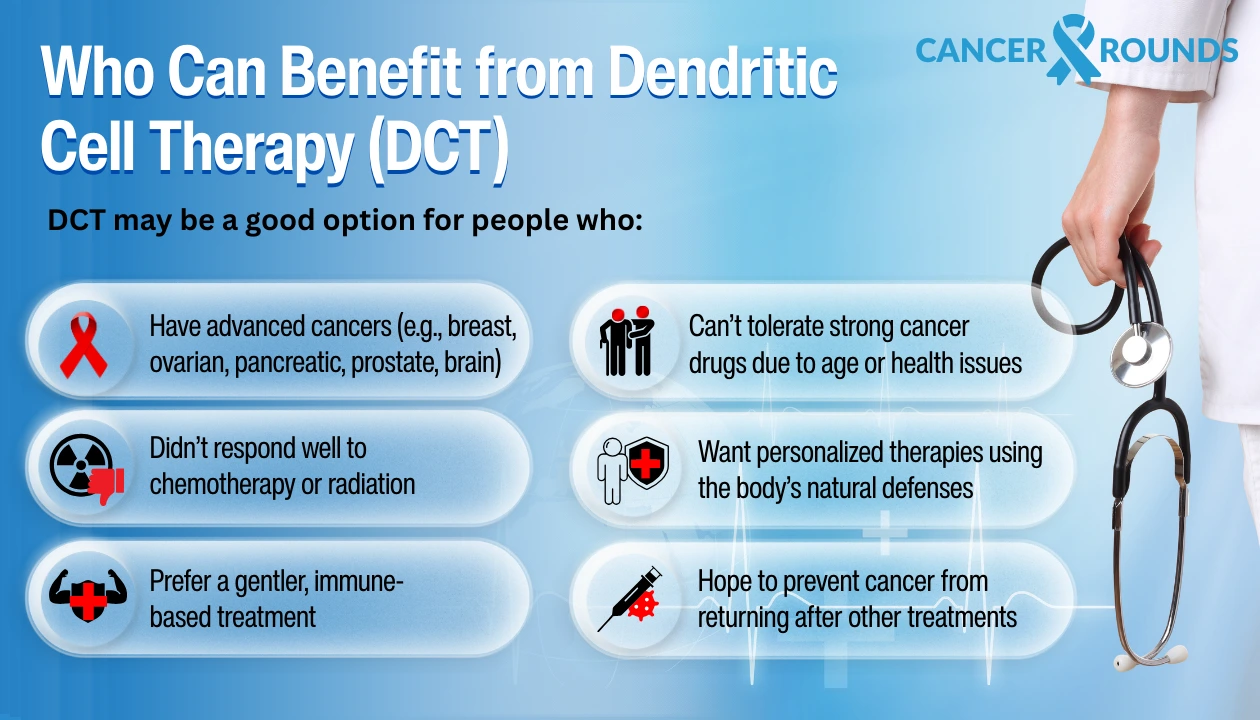
Contraindications & Complications
While DCT is generally well-tolerated, contraindications may include:
- Severe immunodeficiency or autoimmune diseases
- Active systemic infections
- Ongoing immunosuppressive therapy
Possible complications (rare):
- Low-grade fever
- Injection site inflammation
- Mild flu-like symptoms
- Autoimmune flares (very rare)
5 easy Steps to Get Treated in Germany

Share Case Details

Get Expert Opinion and Hospital Quotes

Get Visa Invitation & Hotel Recommendations

Get Received At Airport and Start Your Treatment

Travel Back and Get Followups Through Us
Treatment Protocol & Management
Stepwise Management:
- Initial Immuno-oncology Consult
- Comprehensive Tumor Profiling
- Monocyte Harvest via Leukapheresis
- Cell Culture & Antigen Loading
- Multiple Vaccination Cycles (3–6 sessions)
- Response Monitoring: Imaging + Biomarkers
- Adjunctive Rehabilitation & Supportive Care
Rehabilitation & Follow-up Care
Germany’s integrative oncology units ensure post-DCT care includes:
- Immune support protocols (vitamin D, trace elements)
- Psycho-oncology and fatigue management
- Tumor surveillance with PET-CT/MRI every 3–6 months
- Coordination with referring oncologists for continuity of care
Are you or your loved one an Ideal Candidate?
- Recurrent/relapsed patients not eligible for further chemotherapy
- Those with localized but inoperable tumors
- Long-term survivors seeking recurrence prevention after surgery
- Patients with tumor dormancy risk post systemic therapy
Benefits of Dendritic Cell Therapy
- Personalized and non-toxic
- Minimal hospital stays (often outpatient)
- Boosts long-term immune surveillance
- Enhances quality of life
- Integrates well with radiotherapy or targeted therapy
- Can be repeated with new antigens upon relapse
The Role of Germany’s Cancer Immunology Teams and cancer rounds team
German centers coordinate with cancer rounds team comprising:
- Medical oncologists
- Cellular immunotherapists
- Clinical pathologists
- Molecular biologists
- Psychosocial oncology experts
Together, they ensure precise candidate selection, cell processing, and real-time response tracking for international and domestic patients.
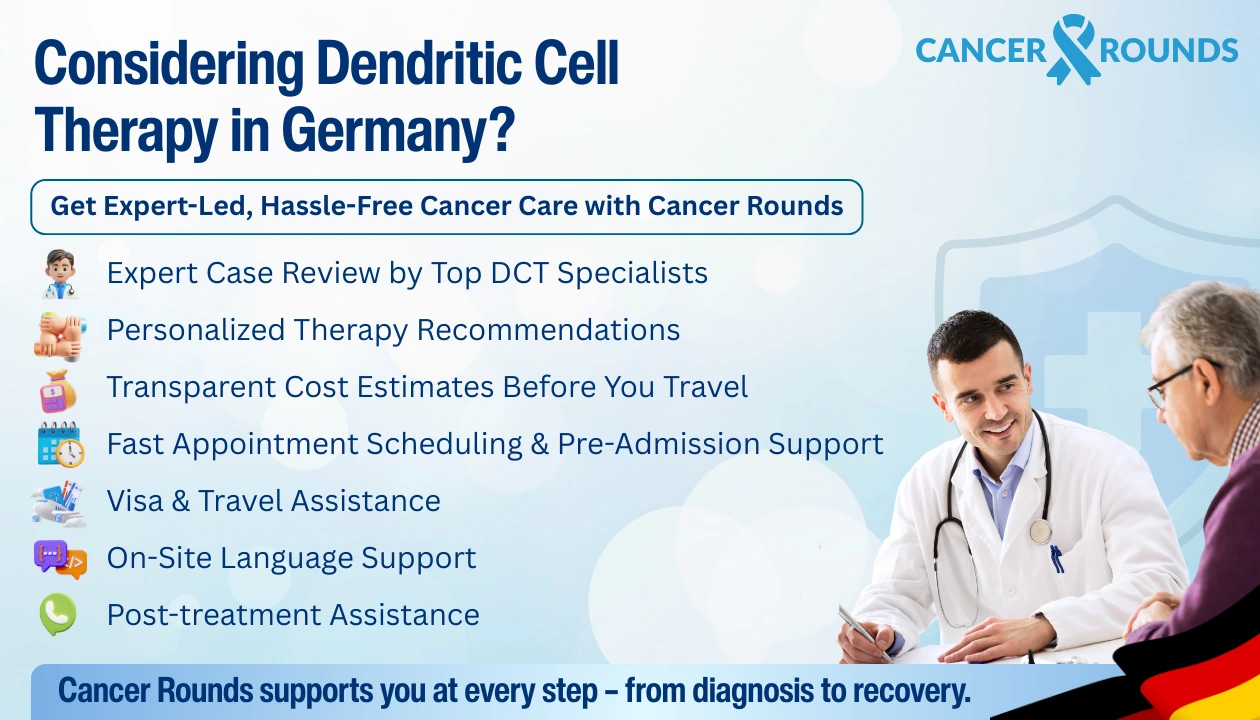
City-wise Leading Hospitals in Germany for DCT
| City | Hospital/Institute | Specialty |
| Berlin | Berlin Immunotherapy Institute | Stage 4 solid tumors, recurrent ovarian and breast ca |
| Heidelberg | Heidelberg University Hospital (NCT) | Glioblastoma, advanced pancreatic cancer |
| Munich | Medias Klinikum | Head & neck, prostate, glioma |
| Frankfurt | Frankfurt Oncology & Immunotherapy Center | DCT + checkpoint inhibitors combo |
| Hamburg | UKE – University Medical Center Hamburg-Eppendorf | Breast, ovarian, and pediatric tumor DCT |
For International Patients
- English-speaking coordinators
- Tele-consultation prior to travel
- Complete support: visa, accommodation, post-treatment travel advice
- Multi-cycle packages with fixed pricing
- Airport pickup & translation services available
Success Rates & Outcomes
- Glioblastoma: 1-year survival improved in ~40% of patients
- Breast Cancer (Metastatic): PFS extended by 6–10 months in selected cases
- Pancreatic Cancer (Stage IV): DCT responders show longer OS vs. controls
- Head & Neck Cancer: Durable responses in HPV-negative tumors
Outcomes are enhanced when DCT is paired with low-dose chemotherapy, checkpoint inhibitors, or hyperthermia.
Why Patients from the UK, USA, and Worldwide Choose Germany for Advanced Cancer Treatment
For international patients exploring advanced, highly personalized immunotherapy options abroad, Dendritic Cell Therapy (DCT) in Germany represents a leading-edge solution. Germany’s commitment to innovative cancer research and advanced immune-oncology attracts individuals from the UK, US, Canada, Ireland, Saudi Arabia, Holland, the broader Middle East, and globally. If you’re an international patient seeking alternative or complementary cancer treatments and navigating complex medical landscapes, Cancer Rounds is your dedicated specialized medical facilitator, immune-oncology expert, and international patient coordinator, simplifying access to Germany’s pioneering Dendritic Cell Therapy clinics and specialized services, particularly in research-driven cities like Frankfurt, Cologne, and Berlin.
Why International Patients Prioritize Germany for Dendritic Cell Therapy
German medical institutions are globally recognized for their cutting-edge approach to immune-oncology, seamlessly integrating advanced cell culture facilities, personalized treatment protocols, and rigorous scientific oversight. Patients choose Germany for compelling reasons when considering Dendritic Cell Therapy (DCT) medical tourism:
- Pioneering Immune-Oncology Research: Germany has a strong heritage in immunology and is at the forefront of developing and refining cellular therapies like DCT. Leading research institutions and specialized clinics, particularly in areas like Frankfurt and Cologne, offer advanced, often individualized, dendritic cell vaccine protocols tailored to a patient’s specific tumor antigens.
- Highly Personalized Treatment Approach: Unlike conventional therapies, DCT involves isolating a patient’s own dendritic cells, activating them with tumor-specific antigens in a lab, and then re-injecting them to stimulate a targeted immune response. This highly individualized cancer immunotherapy in Germany is a significant draw for patients seeking a bespoke solution.
- Integrated Complementary Care: German centers often integrate DCT within a broader, holistic cancer management strategy. This may involve combining it with conventional treatments or other supportive therapies, enhancing overall treatment efficacy and patient well-being under rigorous medical supervision.
- Stringent Quality Control and Expertise: Germany adheres to exceptionally high standards in medical care and laboratory practices. Patients benefit from the expertise of highly specialized immunotherapists and oncologists who meticulously oversee the cell manufacturing process and treatment administration, ensuring optimal safety and efficacy for dendritic cell therapy in Germany.
- Access to Novel Immune Strategies: For those with limited conventional options or seeking to augment standard care, DCT offers a novel biological approach to harness the body’s own defenses against cancer. This is particularly appealing for patients seeking innovative cancer treatments in Europe.
Cancer Rounds: Your Trusted Partner for Accessing Dendritic Cell Therapy in Germany
At Cancer Rounds, we understand the specific complexities involved in accessing specialized, innovative treatments like Dendritic Cell Therapy – from identifying the right clinics and navigating complex protocols to managing logistics. We act as your essential conduit, directly connecting you with Germany’s top dendritic cell therapy clinics and leading immune-oncology specialists in key centers like Frankfurt, Cologne, and Berlin. We are leaders in international patient services for advanced cancer therapies.
For Patients from the UK, US, and Canada Seeking Innovative Immunotherapy:
If you are from the UK exploring advanced, non-conventional cancer treatments or require an expert assessment for dendritic cell therapy beyond what’s available domestically, Cancer Rounds provides direct pathways to German innovation. Similarly, patients from the US looking for pioneering European immune-oncology approaches or Canadians seeking alternative cancer therapies can leverage our services for consultations and access to specialized DCT programs in Germany’s advanced facilities. We ensure you receive thorough medical reviews from esteemed overseas specialists.
For Patients from the Middle East and Saudi Arabia Considering Immune-Based Treatments:
We recognize the unique considerations for patients from the Middle East and Saudi Arabia when pursuing cutting-edge dendritic cell therapy in Europe. Cancer Rounds meticulously streamlines your journey, arranging swift access to leading German immune-oncology specialists in cities such as Frankfurt and Berlin, facilitating expert consultations for DCT suitability, and linking you with personalized immune treatments. We are your dedicated ally in securing high-quality innovative cancer care in Germany without the typical logistical complexities.
For Patients from Ireland, Holland, and Other International Regions Exploring Advanced Options:
Whether you are from Ireland seeking next-generation immunotherapies for cancer, or from Holland and other international locations exploring the potential of dendritic cell therapy, Cancer Rounds ensures a seamless and efficient process. We simplify access to specialized DCT programs and personalized treatment planning in Germany’s leading immune-oncology centers, empowering you to focus entirely on your health and potential recovery.
Our Comprehensive Support for Your Specialized Medical Journey:
Cancer Rounds offers meticulous, end-to-end support tailored for patients accessing highly specialized treatments. Our services encompass all logistical intricacies, including medical record translation, visa assistance, travel arrangements, specialized accommodation, and crucial language assistance throughout your medical journey in Germany. We meticulously manage these details so you can concentrate solely on your health and treatment, making international medical travel for immunotherapy stress-free. Our extensive network guarantees you receive a bespoke treatment strategy, leveraging Germany’s advanced medical capabilities, precisely tailored to your individual needs as an international cancer patient.
Do not let geographical distance or administrative complexities impede your access to pioneering Dendritic Cell Therapy in Germany. Let Cancer Rounds be your trusted guide to receiving timely, comprehensive, and advanced immune-oncology care in Germany’s celebrated medical centers. Contact us for Germany cancer treatment cost information and to understand more about how to get innovative treatment in Germany for cancer.
FAQs Related to Dendritic Cell Therapy
Q1. What is Dendritic Cell Therapy and how does it work for cancer patients?
Dendritic Cell Therapy (DCT) is an advanced personalized immunotherapy that uses a patient’s own immune cells to recognize and attack cancer. In this procedure, dendritic cells are harvested, matured in a lab, loaded with tumor antigens, and reintroduced to stimulate a targeted immune response. This helps the body recognize and destroy cancer cells more effectively. It’s especially promising for patients with advanced-stage or relapsed cancers.
Q2. Which cancers can be treated with Dendritic Cell Therapy in Germany?
German immunotherapy centers have reported positive outcomes using DCT for:
- Glioblastoma and brain tumors
- Pancreatic cancer
- Breast and ovarian cancers
- Melanoma
- Prostate cancer
- Colorectal and lung cancers
It is also used as a recurrence-prevention strategy post-surgery or chemotherapy in certain cancers.
Q3. Who is an ideal candidate for DCT?
Patients who are:
- Diagnosed with Stage III or IV cancer
- Non-responders or relapsed after chemotherapy
- Looking for immune-boosting complementary treatment
- In relatively good general health to undergo leukapheresis
DCT is particularly valuable for patients who want a non-toxic, organ-preserving cancer treatment.
Q4. Which are the top hospitals for Dendritic Cell Therapy in Germany?
Some of the leading DCT centers include:
- Human Klinik, Munich (Prof. Dr. Frank Gansauge)
- IOZK Immunotherapy Center, Cologne
- Hallwang Private Oncology Clinic, Baden-Württemberg
These centers offer world-class facilities, personalized protocols, and integration with hyperthermia, virotherapy, or low-dose chemo.
Q5. What is the cost of DCT in Germany for international patients?
The indicative cost of DCT in Germany ranges from €18,000 to €45,000. It depends on:
- The type and stage of cancer
- Number of dendritic cell infusions required
- Supportive therapies included in the package (e.g., hyperthermia, blood tests)
Patients are encouraged to request a pre-treatment cost estimate through services like Cancer Rounds.
Q6. How long does the treatment process take?
The full DCT cycle usually takes 2 to 4 weeks, including:
- Initial assessment and immune profiling
- Leukapheresis (blood cell collection)
- Lab-based dendritic cell processing (7–10 days)
- Series of infusions and follow-ups
Some patients may return home in between or extend the stay for integrated therapies.
Q7. Are there any side effects of DCT?
Dendritic Cell Therapy is generally well-tolerated. Minor side effects may include:
- Low-grade fever
- Fatigue
- Local reaction at the injection site
These symptoms are usually short-lived and indicate immune activation. Compared to chemotherapy, DCT has minimal toxicity and no organ damage.
Q8. What are the expected results or success rates?
DCT is not a miracle cure, but it has shown:
- Improved disease-free survival (DFS)
- Delayed progression in aggressive cancers
- Boosted overall immunity and quality of life
Success often depends on early initiation, tumor biology, and whether it’s used as part of a multimodal treatment plan.
Q9. Can DCT be combined with other cancer treatments?
Yes. In Germany, multimodal protocols are popular:
- DCT + Hyperthermia
- DCT + Virotherapy or NK cells
- DCT + Low-dose Chemotherapy
This synergistic approach may increase the immune response and target cancer more effectively while preserving patient strength.
Q10. How does Cancer Rounds help with DCT in Germany?
Cancer Rounds offers:
- Expert case evaluation by DCT specialists
- Fast-tracked hospital access
- Cost transparency and detailed itinerary
- Visa and travel support
- Language translation and remote follow-ups
You May Be Also Interested In
All Treatment Pages
Related Patient Stories
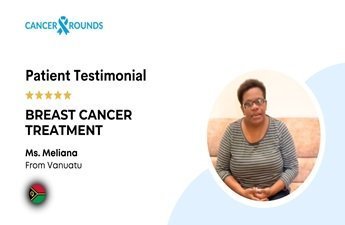
Forever grateful to Cancer Rounds and Dr. Priya Tiwari for supporting me through chemo. Your care means everything.
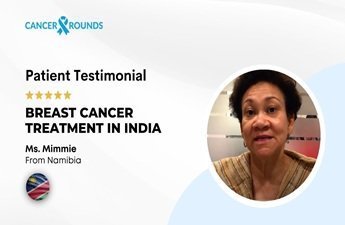
So grateful to Cancer Rounds and Dr. Sudip Raina for helping me through my breast cancer journey. I'm healing, hopeful, and feeling like myself again!
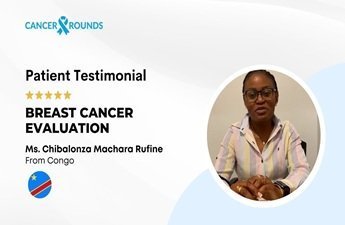
I was scared and uncertain, but Cancer Rounds helped me find answers. Thanks to their support and Dr. Arun Behl’s care in India, I found peace of mind—no cancer. Forever grateful for the kindness and clarity I received.
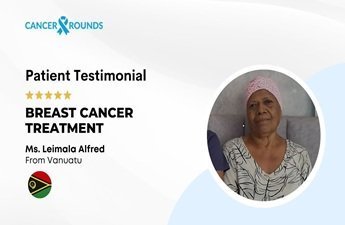
Thank you Cancer Rounds and Dr. Deepak Jha for your support and care during my breast cancer journey. I'm healing with hope because of you.
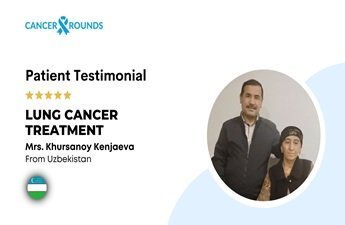
Thanks to Cancer Rounds and BLK Hospital, I made it through lung cancer. Dr. Agarwal gave me more than treatment—he gave me hope.
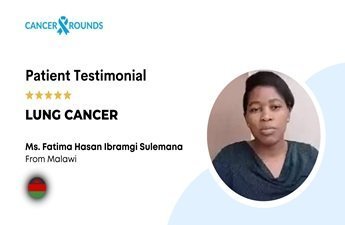
My mother’s health was declining because of lung cancer. Thanks to Cancer Rounds & Wockhardt Hospital, she is now improving. We’re truly thankful.
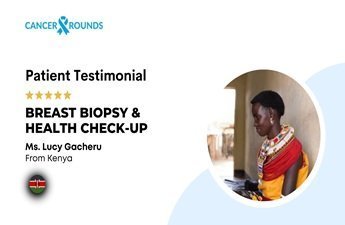
Cancer Rounds guided me to the right hospital. My breast tests came out fine. Thanks to Dr. Pandey, I now feel calm and healthy.
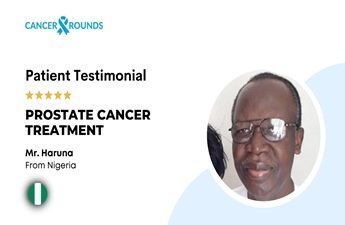
I was battling prostate cancer and back pain when I found Cancer Rounds. They were incredibly helpful, handling everything from the visa to the treatment and hotel stay. I am truly grateful for their support.
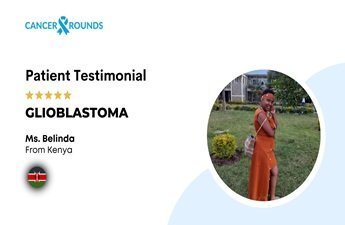
From Kenya to India, Cancer Rounds helped me find the right care for my brain tumor. Thanks to Dr. Sandeep Vaishya, I’m healing after brain tumor surgery.
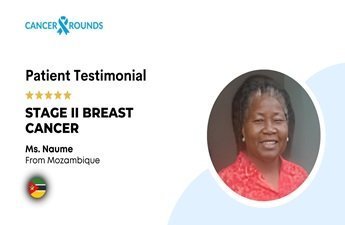
I'm deeply grateful to Dr. Kapil Kumar and BLK Max Hospital for helping me overcome Stage II breast cancer. Thanks to Cancer Rounds, I’m now cancer-free and thriving!
Our Impact
CancerRounds is making quality cancer care accessible to more people every day.




Why Choose India for Cancer Treatment?

World-Class Care
Skilled oncologists provide top-tier medical services

Affordable Treatment
Costs are significantly lower than in Western countries.

Comprehensive Packages
Hospitals offer all-inclusive plans covering surgery, stay, and aftercare.

Easy Accessibility
Well-connected airports and international flight routes.

Proven Success
High patient satisfaction and positive treatment outcomes
Thank You!
Your form has been submitted successfully.






 Chat on WhatsApp
Chat on WhatsApp